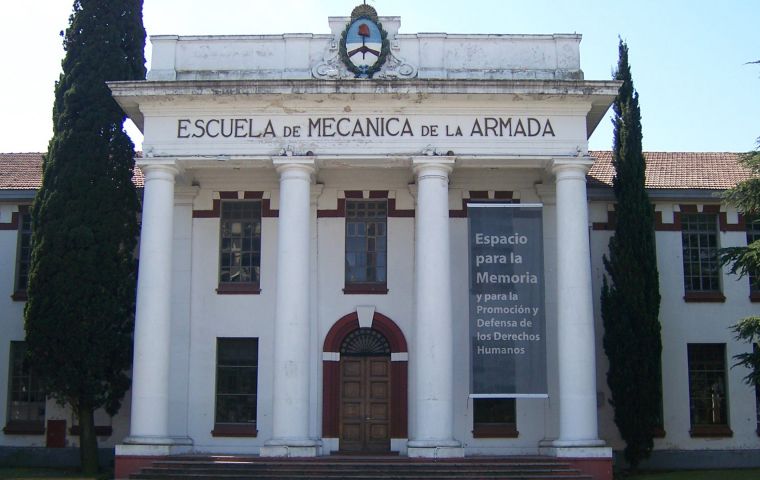MercoPress. South Atlantic News Agency
Former detention center in BA granted Mercosur patrimony status
 Pietragalla Corti said the distinction was a recognition for the entire region
Pietragalla Corti said the distinction was a recognition for the entire region The former Argentine Navy's Mechanics School, which functioned as a clandestine detention center during the 1976-1983 military regime and was later turned into the Memory Museum to promote awareness about human rights violations, has been granted Mercosur cultural heritage status by the Culture Ministers of the bloc, who convened Friday in Buenos Aires for their 54th meeting.
The initiative was promoted by Brazil's National Institute of Historical and Artistic Heritage (Iphan), Agencia Brasil reported. Hence, Brazil's Culture Minister Margareth Menezes presented the Argentine authorities with the certificate.
Menezes insisted that Brazil too needed a memorial about the dictatorial period experienced by the country. “We also went through, in Brazil, on this issue of dictatorship and torture, and this is a memory that is still very dear to us, that we are also in search of actions with this magnitude of having a memorial. [The goal is] for it to be reflected on the next generations and even for our generation to also reflect on the right to life, freedom, and democracy,” she stated.
She pointed out that, in the Brazilian delegation traveling to Buenos Aires, is the president of the National Arts Foundation (Funarte), Maria Marighella, daughter of the Bahia communist guerrilla and former Congressman Carlos Marighella, who died in 1969 after joining the armed struggle against the military dictatorship.
“This action by Mercosur strengthens the call for attention from all of us, from Latin America, and also from the world. Because we don't want any more power installations where freedom of expression and freedom of ideas are condemned, where torture is the curtailment of speech, which is a serious matter,” Menezes went on.
Marighella said she was thrilled with the approval of the Esma as Cultural Patrimony of Mercosur, for being a place of memory of Argentine victims of the dictatorship.
“It is with great emotion that we arrive at this site of memory, this space that is now a cultural space of Mercosur. We know that memory is a people's right, it rebuilds dreams and, with the strength of culture, we will found this Brazil, this Latin America of justice and equality of tomorrow,” she stressed.
Argentina's Minister of Human Rights Horacio Pietragalla Corti, said that this was the first building destined for the memory of the victims of Argentine repression. “We understand the Esma [as a place] emblematic of what the military dictatorship was not only for Argentina but for the region. When we started thinking with the authorities about the recognition of the museum, we understood that this is an award to Argentina. It is for all of Latin America and for the more than 300,000 prisoners and [persons who] disappeared throughout the great country. So, it is an award to the struggle, to the resistance, to the family that still continues in the fight for justice, for memory, and for truth,” he explained.
The Argentine Culture Minister, Tristán Bauer, thanked the Brazilian Culture Minister and the other Mercosur Culture Ministers for voting in favor of granting the Site of Memory Museum the certificate of “cultural heritage” of the bloc of South American countries. “This is a humanitarian act and good for humanity. And it is important so that these stories will never be repeated,” he stressed.
In 2004, the government of then-President Cristina Kirchner turned the ESMA building into the “Espacio para la Memoria y para la Promoción y Defensa de los Derechos Humanos” or Esma Memory Site Museum.
(Source: Agencia Brasil)




Top Comments
Disclaimer & comment rulesCommenting for this story is now closed.
If you have a Facebook account, become a fan and comment on our Facebook Page!